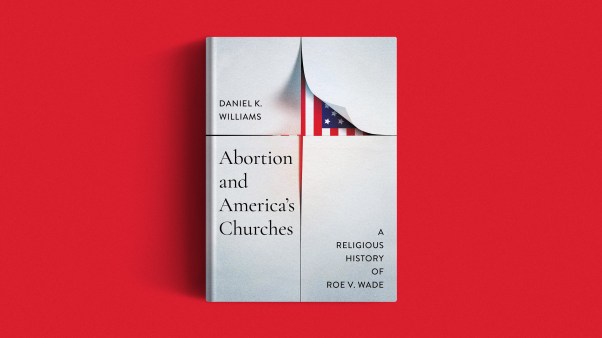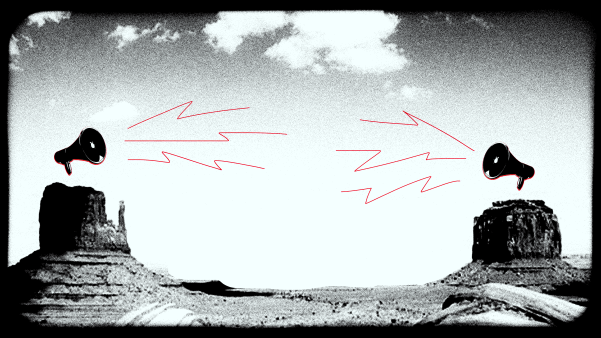Garth Bolinder
It was the first time I’d ever been to Chautauqua, the historic conference center in western New York. As the congregation gathered in the open auditorium singing “Day Is Dying in the West,” I seemed to step back into an earlier era of revival fervor.
Much to my delight, the vespers service was to be a Messiah sing-along. I looked forward to singing to my heart’s content. Who cared if it was the middle of July?
My first dilemma was where to sit. I can’t sing quite high enough to be a decent tenor, yet my shovel isn’t big enough to dig out the deepest bass notes. So I sat exactly in the middle and sang whichever way the wind seemed to be blowing.
To my surprise, there were several others like me. There were even some who sang parts Handel never dreamed of. But we were all there to sing great music regardless.
No doubt many people around the world who have sung the Messiah have little, if any, saving faith in the One about whom they have sung. But the words proclaim his truth regardless of the condition of the singer (should I say sinner?). One such man was sitting next to me that night at Chautauqua. He made it clear before we started that he was an agnostic, but he loved to sing the Messiah. “Great music,” he said. “Speaks to everybody, regardless of belief.”
Indeed, I thought, that’s a perceptive statement. It’ll even preach. My reverie was broken by the grand overture of the Chautauqua pipe organ. As we began to sing, my companion really entered in. His entire body sang. Several times I thought the spring would break. After we sang the “Hallelujah Chorus,” he said, with the veins on his reddened neck still pulsating and a transparent glow on his face, “That’s enough to roll anybody’s socks up and down!”
Though I’d never heard it put quite that way, he had it right. Music reaches the depths of human personality in ways mere words never can. William Cowper said,
“Sometimes a light surprises
The Christian while he sings.”
If music is a primary vehicle for worship, it also aids and supplements the teaching and healing ministries of the church. Scripture gives ample example of this three-fold relationship. King David was a wise leader who knew the power, place, and peace of music. Everyone is familiar with his majestic psalms of adoration to God. They inspire worship. He even managed to sing and dance before the Lord and his troops as they prepared for or returned home from battle. Did MacArthur, Patton, or Ike ever try that?
Consider also, though, how David taught his people through the effective use of song. Many of his lyrics fairly drip with historical facts, political intrigue, and moral admonition. His songs, like modern-day slogans, etched truth into the minds of Israel. We feel their poignant power today.
Or what about David’s tender use of music in healing? Instead of angry rhetoric or hell-bent revenge, David took up his ancient lyre and actually played it to soothe the tormented mind and heart of his self-destructive adversary.
I don’t remember reading about such an event in the political arena of our day. But then, I can’t remember hearing of it during most church fights, either. Would strumming a few notes quench the darting flames of those “well-intentioned dragons?”
Teaching
Music can ingrain truth in the mind for a lifetime. Though usually thought of as applying only to children, this principle applies to adults as well. And the very same junior high students who wail, moan, and gnash their teeth when given a confirmation memory assignment can turn around and sing the latest popular songs word-perfect.
Almost all children sing Sunday school songs. In fact, almost all children sing, period. It’s as we get older that we become self-conscious, inhibited, and dull. Children burst with rhythm, melody, and rhyme. So Sunday school and junior church must have lots of music.
The thousands of Suzuki music students around the world testify to the fact that children can master more music than we estimate. Not only are they able immediately to integrate much of the biblical truth in the songs they sing, but great spiritual seeds are planted that will spring into life at a later date. My oldest daughter’s choir director is teaching her fourth- through sixth-graders a new hymn every month. This month it’s “Immortal, Invisible, God Only Wise.” Imagine that! My earliest memory of that hymn goes back no further than college days. Then my third-grader wants to sing “The Church’s One Foundation” or “For All the Saints” or “A Mighty Fortress Is Our God” on the way to school. I’d better learn all the verses.
In our media-saturated society, with wall-to-wall music each new day, these implanted hymns are spiritual dynamite. Edna Hong writes about such an experience in her book From This Good Ground: “For children, at least for this child [meaning herself], the Word of God received from the church in the home and the church in the community was like a time capsule that activates the spirit at some future date.… Even now, half a century later, the capsulated Word of God explodes in my mind and spirit, and a verse that shed no light for me or on me the first time I heard it—or the tenth—or the twentieth time! suddenly illuminates!”1
In our work with children’s choirs, we’ve found the following three principles to be strategic:
1.The church and especially the parents of choir children must be active supporters.
2.Choir should be fun. This may be controversial, because good music demands sacrifice. But few of us will commit to something that’s repeatedly boring. This is especially true in our channel-switching culture. Don’t get me wrong. These children work hard. But it’s all in the context of enjoying God’s good gift of music.
3.A children’s choir is to be educational, not performance-oriented.
Most any church can do this. With the deluge of children’s musicals available with taped accompaniment (at a Christian bookstore, or on loan from another church), a committed person can get together a small group of children and begin teaching songs. Even if the choir doesn’t grow into a massive chorale, the children are still learning eternal truths about the Christian faith and life.
They’re also learning about Christian community (“How come he gets the solo and not me?”).
They’re also learning music skills.
There’s one more benefit. The children’s and youth choirs become a “farm system” to feed the “majors,” that is, the adult choirs.
As David Wolper said in an interview about his production of the Los Angeles Olympic ceremonies, “We’re going to have lots of music, because music is the United States’s gift to the world.” Children and young people know this very well. So many of the children’s and youth musicals available today are upbeat. It’s natural for young people to sing them; memory becomes easier; and Christian truth is taught.
Healing
Kelly was a beautiful four-year-old girl. Her willowy hair and crystalline eyes caused people to turn and look when she was carried into a room. Kelly was severely retarded and a victim of cerebral palsy.
My wife worked as a governess to Kelly one summer, and we both fell in love with her. In the process of each day’s therapeutic routines, Dixie began to sit Kelly down at the piano and play and sing simple tunes to her. It was as if a peaceful spell came over the girl. If agitated, she calmed down. If distracted, she began to focus. If afraid, she began to trust again. Little by little, the gift of music began to soothe and sort her palsied mind.
It’s no wonder E. Thayer Gaston in the book Music in Therapy states that all music therapies agree on three primary principles. I list them with some added pastoral comments:
1.Music therapy helps to establish or re-establish interpersonal relationships (koinonia, Christian community; no wonder music has been central to God’s called-out people).
2.Music therapy helps bring about self-esteem. (We’re made in the image of God. Humanness was God’s chosen means through which to fully reveal himself.)
3.Music therapy helps utilize the unique potential of rhythm to energize and bring order. (“God is a God of order, not confusion,” writes Paul. The Christian faith and life are not chaotic and confusing. Rather, Christ makes all things new. “We are ambassadors for Christ, God making his appeal through us.”)
Though some Christians have explored this area (for example, singer Ken Medema’s work with handicapped children), much remains to be learned. We acknowledge the therapeutic value of music at weddings, funerals, and special events. But do we see each worship service, each choir rehearsal, each Sunday school class, each youth group song time as a means for the healing grace of Christ to be ministered to needy people?
This is what cross-country walker Peter Jenkins discovered at the Mount Zion Baptist Church in Smokey Hollow, Texana, North Carolina. The only white person in an all-black church and wearing what he described as a green neon suit, he felt rather self-conscious and alone. But as the service started and the singing warmed up, he felt a tide of spiritual healing flow through the two-hour service.
“Wave after wave washed through the church and washed the people clean. ‘A-man, A-man … A-man.'”
Then he writes about watching Pau Pau Oliver singing and shouting in the joy of the Lord. This occurred “when a member of the church was so unself-conscious and so immersed in worshiping God that he stood and began to sway and proclaim loudly, ‘Thank you, Jesus,’ with deep feeling and sincerity.… Leaving church wasn’t as easy as it was back in Connecticut, where everyone rushed home to eat or catch a football game on TV. On the way out with Zack, Bruce and Eric, I had to shake more hands than I had in years. I felt charged up for life, and here I thought us white folks held all the stock. I came to live for Sunday while I stayed in Texana.”
While the culture and styles may be different, what pastor doesn’t long for that unself-consciousness and immersion in worship that Peter experienced. What would we do if everyone in our congregations “lived for Sunday”? Music is a powerful agent of spiritual renewal.
Healing is its divine grace note. I need to see music ministry as integral to the life of any church I pastor or belong to. Music is a powerful means of evangelism, the healing of souls. A man who considered himself the most humanistic psychologist in our town came to personal faith in Jesus Christ not through some great preacher or apologist. He happened to slip into the back row of an evening church service and joined the congregation in singing “Alleluia.” During that familiar chorus, he realized his spiritual need, recognized the grace of Christ for the first time, and gave him his life. His wife, standing by his side, experienced the same thing. Music is a mighty witness.
Regardless of ability or taste, music can restore and renew any Christian’s dry and weary spirit. Be it radio, recorded, or live, music leads the way to the balm in Gilead.
If music can be an agent of healing, of course, it can also be an agent of destruction. I don’t intend to harangue on the evils of some modern music, but I do believe we must ask for discernment and discipline so our personal lives, families, and churches can experience the Lord’s restoration and renewal. True music, said Martin Luther, “is hateful to the devil and drives him away.”
Music is God’s glorious and gracious gift. Through it we worship, teach, heal, and fulfill the calling of Christ to minister. It is used in different ways at different times for very different people. The music ministry of your church is as valuable as that of any more visible church with whom you might be tempted to compare. Be encouraged! Music is a gift that’s always available. Its ministry in the church can always improve. That will be no more evident than when we one day hear music as it was intended to be.
I wasn’t there, but I’ve heard the story enough to imagine it. When Norm Johnson finally succumbed to the destructive advance of the fatal A.L.S., he spent his last days in a hospital bed in his living room. Family was near, and friends from church, community, and the music industry visited to encourage him and pray. His faithful wife, Lois, was constantly at his side. One evening, a few days before Christmas, he requested again to hear Handel’s Messiah. As the music enveloped the quiet living room, Norm entered into eternity.
I have often wondered what happened next. How did Norm respond to the Music he’d been waiting all his life to hear? How would he describe it to someone like me?
First I suppose he would digress to encourage me to keep working hard for solid music ministries. He’d remind me it’s a worthy goal. Then he’d probably tell me to appreciate what I have. But I imagine he’d also tell me, with a twinkle in his eye, to get ready. Because I haven’t heard anything yet!
Edna Hong, From This Good Ground (Minneapolis: Augsburg, 1974), p. 70.
© 1986 Christianity Today








